

Analyst Institute. North Carolina’s Voting Law Goes on Trial. It would have been bad enough if the North Carolina Legislature, in a misguided effort to streamline voting procedures, had passed a law that ended up having discriminatory effects.
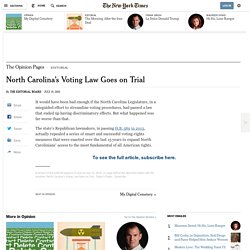
But what happened was far worse than that. The state’s Republican lawmakers, in passing H.B. 589 in 2013, actually repealed a series of smart and successful voting-rights measures that were enacted over the last 15 years to expand North Carolinians’ access to the most fundamental of all American rights.
Economics.mit.edu/files/1205. Zephyr Teachout Extended Interview Video - September 17, 2014 - The Daily Show. Scholar Behind Viral 'Oligarchy' Study Tells You What It Means. You published an advance copy of your study on April 9th, and in just the last few days there's been an explosion of coverage and interest.
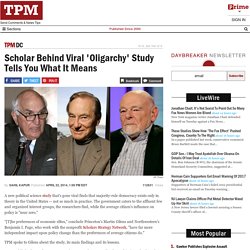
Princeton Study: U.S. No Longer An Actual Democracy. Asking "[w]ho really rules?
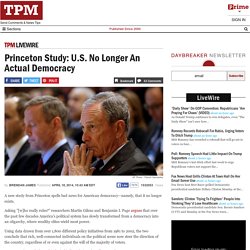
" researchers Martin Gilens and Benjamin I. Page argues that over the past few decades America's political system has slowly transformed from a democracy into an oligarchy, where wealthy elites wield most power. Using data drawn from over 1,800 different policy initiatives from 1981 to 2002, the two conclude that rich, well-connected individuals on the political scene now steer the direction of the country, regardless of or even against the will of the majority of voters. TPM Interview: Scholar Behind Viral 'Oligarchy' Study Tells You What It Means "The central point that emerges from our research is that economic elites and organized groups representing business interests have substantial independent impacts on U.S. government policy," they write, "while mass-based interest groups and average citizens have little or no independent influence.
" OpenSecrets.org: Money in Politics. Ask Andrew W.K.: My Dad Is a Right-Wing Asshole. [Editor's note: Every Wednesday New York City's own Andrew W.K. takes your life questions, and sets you safely down the right path to a solution, a purpose or -- no surprise here -- a party.

Need his help? Just ask: AskAWK@villagevoice.com] Hi Andrew,. Chuck Schumer Is Wrong About the Top-Two Primary. In an op-ed in Tuesday’s New York Times, Sen.
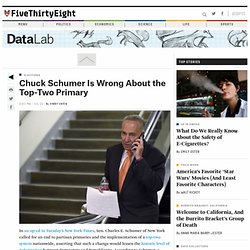
Charles E. Schumer of New York called for an end to partisan primaries and the implementation of a top-two system nationwide, asserting that such a change would lessen the historic level of polarization between Democrats and Republicans. According to Schumer, a Democrat, all we need to do to get more moderates elected is use the system put in place in California. There, all candidates, regardless of party identification, face off against one another in the primary. The two top vote-getters advance to the general election. Campaignlegalcenter.org. Coalition for Open Democracy. How technology can be used to combat political apathy. Michael Owen hasn't, Russell Brand can't bring himself to do it, and Simon Cowell can't be bothered.
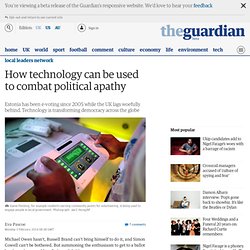
But summoning the enthusiasm to get to a ballot box is not just a problem facing celebrities. With turnout continuing to fall and a Hansard Society survey revealing only 12% of young people plan to vote at the next general election, it's no wonder a raft of initiatives are being launched to try and narrow the widening gap between politicians and young voters. John Bercow's efforts to upgrade Parliament to version 2.0 with a commission on digital democracy and attempts to bring councils into the digital age by Local Democracy Bytes, an online community supporting the redesign of local democratic relationships, suggest the penny is finally dropping. But where do the solutions lie?
If we're going to reverse political apathy among young people, radical solutions need to be road-tested at a local level and that means councils pioneering new democratic approaches. American Civics.
Brennan Center for Justice. Princeton Election Consortium — A first draft of electoral history. Drew Linzer: The stats man who predicted Obama's win. 8 November 2012Last updated at 22:41 ET By Kate Dailey BBC News Magazine Nate Silver of the New York Times explains the science of presidential predictions Pundits insisted the presidential race was a toss-up, but "polling aggregators" - who analyse polls to make predictions - were being criticised for favouring President Obama.
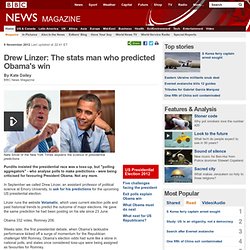
Not any more. In September we called Drew Linzer, an assistant professor of political science at Emory University, to ask for his predictions for the upcoming US presidential election. Linzer runs the website Votamatic, which uses current election polls and past historical trends to predict the outcome of major elections. Obama 332 votes, Romney 206. Weeks later, the first presidential debate, when Obama's lacklustre performance kicked off a surge of momentum for the Republican challenger Mitt Romney, Obama's election odds had sunk like a stone in national polls, and states once considered toss-ups were being assigned as favourites for Romney.
Representation Concerns. Political Parties. Foundational/ Fundamental Concepts. Campaign Finance. Media Matters. Leadership Qualities. Summary of Carter Center’s Second Interim Statement on the Election Commission of Nepal's "Voter Register With Photograph"